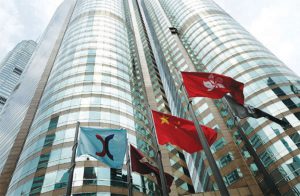Bloomberg
Hong Kong stocks posted their biggest post-Lunar New Year holiday advance since 2009, as traders played catch-up to gains in global equities and a rally in financials outweighed the impact of an overnight tech rout in the US.
The Hang Seng Index closed up 3.2% on Friday. AIA Group Ltd. and HSBC Holdings Plc were among those leading gains. The Hang Seng Tech Index climbed 3.1%. Mainland China markets will reopen on Monday.
Global equity markets endured volatility while Hong Kong was closed. While that led some to expect fluctuations as trading in the city’s shares resumed, the benchmark equity index got a boost from financial stocks after a hawkish pivot by central banks in Europe brightened the outlook for the sector on higher rates. Gains were also seen in certain industries linked to Winter Olympics, such as sportswear brands.
There is “more upside†possible in the medium term as China eases monetary and fiscal policies further to support economic growth, said Steven Leung, executive
director at UOB Kay Hian (Hong Kong) Ltd.
The Hang Seng Index closed above its 100-day moving average on Friday. Its gains come after shares of Chinese companies listed in the US advanced during the holiday period. The Nasdaq Golden Dragon China Index — which includes many large Chinese technology firms — has jumped 5% since Hong Kong last traded at mid-day, helped in part by encouraging commentary from the country’s
cyberspace watchdog.
Equity benchmarks in Seoul, Singapore and Kuala Lumpur had all posted post-holiday jumps, providing some reassurance for a positive open in Hong Kong. The US tech selloff also showed signs of easing in late trading after Amazon.com Inc. and Snap Inc. soared on quarterly results.
Yet there are significant threats to a sustained recovery in Hong Kong and mainland stocks, even as an increasing number of global banks turn bullish on them.
Some investors continue to sell into rallies, China’s property-market distress remains acute and the slowing pace of economic growth continues to weigh. Positive statements toward the technology sector have yet to undo the damage inflicted on the business models of many internet platforms over the past year.
Moreover, the mainland’s CSI 300 Index entered a bear market last week despite Beijing’s efforts to bolster confidence going into the holiday as well as the central bank’s earlier pivot to stimulus.
Hong Kong’s benchmark had fallen into a bear market much earlier, in August, and remains down more than 20% from its peak in February last year.
“It’s clearly a rebound to catch up with the world, but we need to see how Hong Kong can navigate global volatility from here on,†said Joshua Crabb, a fund manager at Robeco Hong Kong Ltd.
 The Gulf Time Newspaper One of the finest business newspapers in the UAE brought to you by our professional writers and editors.
The Gulf Time Newspaper One of the finest business newspapers in the UAE brought to you by our professional writers and editors.
